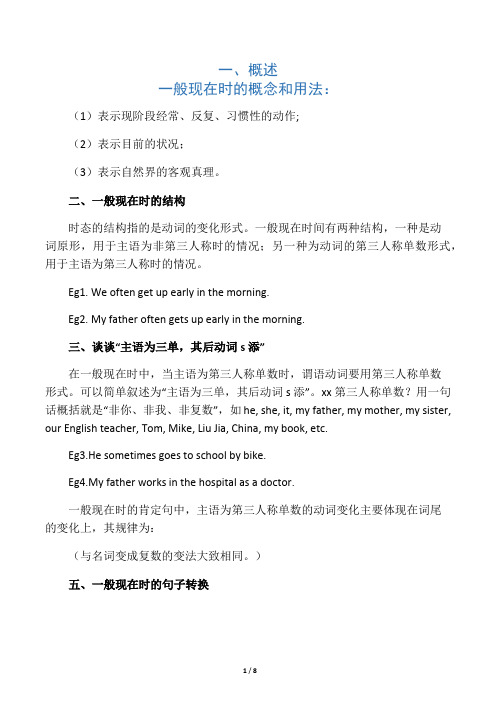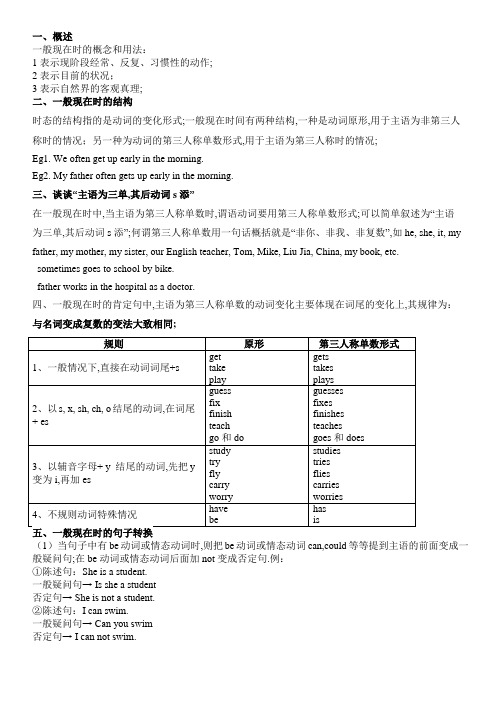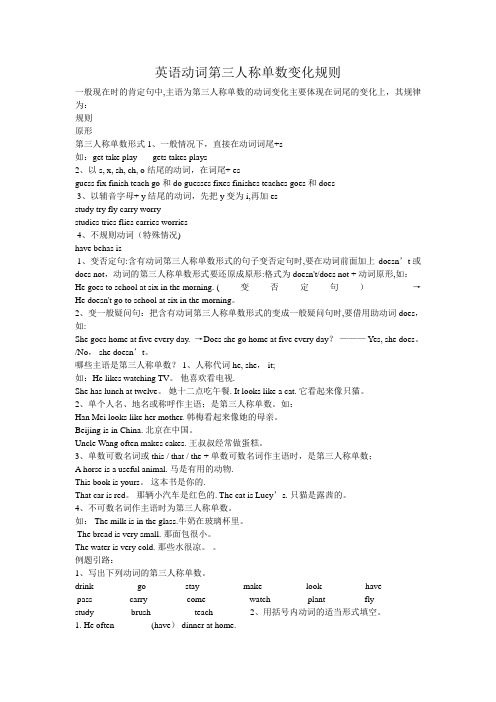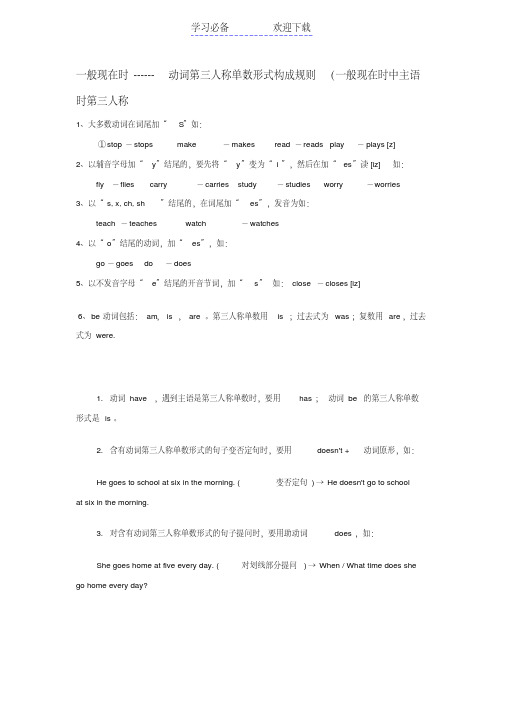一般现在时动词第三人称单数变化规则
动词第三人称单数变化规则

动词第三人称单数变化规则1、一般现在时主语第三人称时的动词变化”-s”①在一般现在时中,当主语为第三人称单数时,动词要用“-s”型(即第三人称单数形式)。
②所谓动词“s”型的构成,可按名词变复数的规则来记,即:•(1)大多数动词直接加__S_ 如:Play-plays,swim-swims.•(2)以_s,x,_ch,_sh,_o_结尾的动词,后面加_es__ 如:watch-watches,wash-washes.go-goes.teach-teaches •(3)以辅音字母加y结尾的变_y__ 为_i__加_es__ 如:study-studies, fly-flies•(4)特殊变化:have - has一.写出下列动词的第三人称单数形式。
read ______go ______stay _____ make _______ brush_______look______have_____ carry___ come______teach_______watch______play_______ fly______study______二、根据所给单词的适当形式填空• 1 He ___ the piano very well. (play)• 2 She ___ got a stamp from Canada .(have)• 3 I ___ housework at home (do)• 4 Eric ___ to school at 6:00 o’clock. (go)• 5 He clothes at home. (wash)• 6 My teacher often ___ TV in the evening. (watch)•7 Daming ___ English well every day.(study)•8 The boys ___ swimming (like)•9 She ____ from America.(come)•10 He ____ like his mother.(look)。
一般现在时动词第三人称单数变化规则

一、概述一般现在时的概念和用法:(1)表示现阶段经常、反复、习惯性的动作;(2)表示目前的状况;(3)表示自然界的客观真理。
二、一般现在时的结构时态的结构指的是动词的变化形式。
一般现在时间有两种结构,一种是动词原形,用于主语为非第三人称时的情况;另一种为动词的第三人称单数形式,用于主语为第三人称时的情况。
Eg1. We often get up early in the morning.Eg2. My father often gets up early in the morning.三、谈谈“主语为三单,其后动词s添”在一般现在时中,当主语为第三人称单数时,谓语动词要用第三人称单数形式。
可以简单叙述为“主语为三单,其后动词s添”。
xx第三人称单数?用一句话概括就是“非你、非我、非复数”,如he, she, it, my father, my mother, my sister, our English teacher, Tom, Mike, Liu Jia, China, my book, etc.Eg3.He sometimes goes to school by bike.Eg4.My father works in the hospital as a doctor.一般现在时的肯定句中,主语为第三人称单数的动词变化主要体现在词尾的变化上,其规律为:(与名词变成复数的变法大致相同。
)五、一般现在时的句子转换当句子中有be动词或情态动词时,则把be动词或情态动词(can,could等等)提到主语的前面变成一般疑问句;在be动词或情态动词后面加not变成否定句.例:①陈述句:She is a student.一般疑问句→ Is she a student?否定句→ She is not a student.②陈述句:I can swim.一般疑问句→ Can you swim否定句→ I can not swim.当句子中即没有be动词,也没有情态动词时,则在主语前加助动词do (you,以及复数), does(单数she,he,it)变成一般疑问句;在主语后谓语动词前加助动词don’t(I,you,以及复数), doesn’t(单数she,he,it)变成否定句,助动词后的动词要变成动词原形。
一般现在时动词三单变化规则

一般现在时动词三单变化规则
1. 对于大多数动词,第三人称单数加上-s或-es。
例如:play → plays, watch → watches。
2. 对于以s, sh, ch, x, z结尾的动词,第三人称单数在词尾加-es。
例如:pass → passes, brush → brushes。
3. 对于以辅音字母加y结尾的动词,将y变为i,再加上-es。
例如:fly → flies, study → studies。
4. 对于以元音字母加y结尾的动词,直接加上-s。
例如:play → plays, enjoy → enjoys。
5. 对于以辅音字母加o结尾的动词,通常在词尾加-es。
例如:do
→ does, go → goes。
但也有例外,如:go → goes。
6. 仅有少数几个动词在第三人称单数形式不变。
例如:have → has, do → does。
值得一提的是,对于be动词,第三人称单数形式是is。
例如:I am, he is。
一般现在时动词第三人称单数变化规则

一、概述一般现在时的概念和用法:1表示现阶段经常、反复、习惯性的动作;2表示目前的状况;3表示自然界的客观真理;二、一般现在时的结构时态的结构指的是动词的变化形式;一般现在时间有两种结构,一种是动词原形,用于主语为非第三人称时的情况;另一种为动词的第三人称单数形式,用于主语为第三人称时的情况;Eg1. We often get up early in the morning.Eg2. My father often gets up early in the morning.三、谈谈“主语为三单,其后动词s添”在一般现在时中,当主语为第三人称单数时,谓语动词要用第三人称单数形式;可以简单叙述为“主语为三单,其后动词s添”;何谓第三人称单数用一句话概括就是“非你、非我、非复数”,如he, she, it, my father, my mother, my sister, our English teacher, Tom, Mike, Liu Jia, China, my book, etc.sometimes goes to school by bike.father works in the hospital as a doctor.四、一般现在时的肯定句中,主语为第三人称单数的动词变化主要体现在词尾的变化上,其规律为:与名词变成复数的变法大致相同;(2)当句子中即没有be动词,也没有情态动词时,则在主语前加助动词do you,以及复数, does单数she,he,it变成一般疑问句;在主语后谓语动词前加助动词don’tI,you,以及复数, doesn’t单数she,he,it变成否定句,助动词后的动词要变成动词原形;例:①陈述句:We get up at 7:00 every morning.一般疑问句→Do you get up at 7:00 every morning否定句→We don’t get up at 7:00 every morning.②陈述句:She has a little brother.一般疑问句→ Does she have a little brother否定句→ She doesn’t have a little brother.哪些主语是第三人称单数1、人称代词he, she, it;如:He likes watching TV. 他喜欢看电视;She has lunch at twelve. 她十二点吃午餐;It looks like a cat. 它看起来像只猫;2、单个人名、地名或称呼作主语;是第三人称单数;如:Han Mei looks like her mother. 韩梅看起来像她的母亲;Beijing is in China. 北京在中国;Uncle Wang often makes cakes. 王叔叔经常做蛋糕;3、单数可数名词或this / that / the + 单数可数名词作主语时,是第三人称单数;A horse is a useful animal. 马是有用的动物;This book is yours. 这本书是你的;That car is red. 那辆小汽车是红色的;The cat is Lucy's. 只猫是露茜的;4、不可数名词作主语时为第三人称单数;如:The milk is in the glass.牛奶在玻璃杯里;The bread is very small. 那面包很小;The water is very cold. 那些水很凉;1、写出下列动词的第三人称单数;drink ________ go _______ stay ________ make ________ look _________have_______ pass_______ carry _______ come________ watch________plant_______ fly ________ study_______ brush________ teach________catch_________ wash___________do________ like________ say_______learn ___________eat___________ read___________ sing___________ buy__________study_______ come__________plant种植______2、用括号内动词的适当形式填空;1. He often ________have dinner at home.2. We _____________ not watch TV on Monday.3. Nick ___________ not go to the zoo on Sunday.4. ________ they __________ like the World Cup5. What _________they often _________ do on Saturdays6. _________ your parents _________ read newspapers every day7. There ________be some water in the bottle.8. My aunt _______look after her baby carefully.9. The child often _______watch TV in the evening.10. Mike’s sister ________ cook nice food. I _______ like eating it very much.11. _______ do your brother_______ watch TV in the evening No, he_______ not.12. We often___________play in the playground.13. He _________get up at six o’clock.brush your teeth every morning.15. What________ do he usually______ do after school studyEnglish,Chinese,Maths,Science and Art at school.17. Mike sometimes __________go to the park with his sister.18. At eight at night, she often__________watch TV with his parents.19. ________ Mike________read English every daymany lessons_________your classmate________have on Monday 21. What time_________his mother_________do the housework_____________ go to school on foot every day .______________ not have any lessons on Sundays ._____________ brush her teeth twice a day .students ____________ be not good at boating .Hua always ____________ carry water for his grandpa on Sundays . ____________ like making friendslazy boy ______________ not do his homework in the evening . many classes _________you __________ have every day__________the baby ___________ look likecan ___________ teach us Enlgish well .11. He often ________have dinner at home.12. Daniel and Tommy _______be in Class One.13. Nick _________not go to the zoo on Sunday.14. What _______they often _______do on Saturdays15. _______ your parents _______read newspapers every day16. The girl ____________teach us English on Sundays.17. She and I ________take a walk together every evening.18. There ________be some water in the bottle.19. They _______have the same hobby.20. My aunt __________look after her baby carefully.21. You always _______do your homework well.22. I _______be ill. I’m staying in bed.23. She _______go to school from Monday to Friday.24. The child often ____________watch TV in the evening.day _______be it today -It’s Saturday.26. He _________ get up at six o'clock.1. I ________to school at 7:00 in the morning.A. goB. goingC. goes2. They _______books every day in the library.B. readC. reading3. The monkey________ eating bananas very much.B. likesC. liking4. My father ________to read newspaper after supper every day.B. likesC. liking5. I like watching TV, but my mother _________like it.A. don’tB. doesn’tC. does6. ____________ your father drink milk every dayB. areC. does7. We will go shopping if it____ tomorrow.'t rain B. didn't rain 't rain D. isn't rain8. He said the sun ____in the east and ____in the west.A rose; setB rises; setsC rises, setD rise; setsMei ____ music and often ____ to music.A like; listenB likes; listensC like; are listeningD liking ; listen10. Jenny____ English every evening.A has studyB studiesC studyD studied3、选出正确的答案:1. She like / likes to play football.2. He like / likes drinking milk.3. I like / likes to watch TV.4. We like / likes to play badminton.5. They like / likes to sing songs.6. She read / reads books every day.7. He play / plays computer games every day.8. It listen / listens to the radio every day.9. Linda draw / draws pictures every day.10. Jane and Linda play / plays football every day.5、把下列句子变为否定句:1. We like playing football.2. Linda swims every day.3. They like playing games.4. My father reads newspaper in the evening.7、把下列句子变为疑问句,并做肯定和否定回答;1. My brother can ride a horse.2. We clean the classroom after school.___________________________________________________________。
英语动词第三人称单数变化规则

英语动词第三人称单数变化规则一般现在时的肯定句中,主语为第三人称单数的动词变化主要体现在词尾的变化上,其规律为:规则原形第三人称单数形式 1、一般情况下,直接在动词词尾+s如:get take play gets takes plays2、以s, x, sh, ch, o结尾的动词,在词尾+ esguess fix finish teach go和do guesses fixes finishes teaches goes和does3、以辅音字母+ y 结尾的动词,先把y变为i,再加esstudy try fly carry worrystudies tries flies carries worries4、不规则动词(特殊情况)have behas is1、变否定句:含有动词第三人称单数形式的句子变否定句时,要在动词前面加上doesn’t 或does not,动词的第三人称单数形式要还原成原形:格式为doesn't/does not + 动词原形,如:He goes to school at six in the morning. (变否定句)→He doesn't go to school at six in the morning。
2、变一般疑问句:把含有动词第三人称单数形式的变成一般疑问句时,要借用助动词does,如:She goes home at five every day. →Does she go home at five every day?——— Yes, she does。
/No, she doesn’t。
哪些主语是第三人称单数? 1、人称代词he, she, it;如:He likes watching TV。
他喜欢看电视.She has lunch at twelve。
她十二点吃午餐. It looks like a cat. 它看起来像只猫。
2、单个人名、地名或称呼作主语;是第三人称单数。
动词第三人称单数形式构成规则

一般现在时------动词第三人称单数形式构成规则(一般现在时中主语时第三人称1、大多数动词在词尾加“S”如:①stop-stops make-makes read-reads play-plays [z]2、以辅音字母加“y”结尾的,要先将“y”变为“i”,然后在加“es”读[iz] 如:fly-flies carry-carries study-studies worry-worries3、以“s, x, ch, sh”结尾的,在词尾加“es”,发音为如:teach-teaches watch-watches4、以“o”结尾的动词,加“es”,如:go-goes do-does5、以不发音字母“e”结尾的开音节词,加“s”如: close-closes [iz]6、be动词包括:am, is, are。
第三人称单数用 is;过去式为 was;复数用are,过去式为were.1. 动词 have ,遇到主语是第三人称单数时,要用 has;动词 be 的第三人称单数形式是is。
2. 含有动词第三人称单数形式的句子变否定句时,要用 doesn't + 动词原形,如:He goes to school at six in the morning. (变否定句)→ He doesn't go to school at six in the morning.3. 对含有动词第三人称单数形式的句子提问时,要用助动词 does,如:She goes home at five every day. (对划线部分提问)→ When / What time does she go home every day?一般现在时中的第三人称单数形式在一般现在时中,当主语是第三人称单数时,谓语动词要用第三人称单数形式,即常在动词原形后加-s或-es。
I 什么是一般现在时?一般现在时的基本用法有哪些呢?【No. 1】一般现在时的功能1.表示事物或人物的特征、状态。
动词第三人称单数的变化规则及练习

动词第三人称单数的变化规那么及练习一、使用情况:在一般现在时中,当主语是第三人称单数时,谓语动词要用第三人称单数形式,即常在动词原形后加-s或-es。
(标志词usually often always sometimes never every等)二、变化规那么1、直接在动词后+s例如:like- likes play-plays2、以s, x, sh, ch, 接尾的动词:+es例如:wash-washes3、以辅音+o接尾的动词:+es例如:go-goes4、以辅音字母+y接尾的动词:变y为i+es例如:fly-flies以元音字母+y接尾的动词后+s例如:play-plays5、除上述规律外,还应注意下面三点:1)动词have ,遇到主语是第三人称单数时,要用has;动词be 的第三人称单数形式是is。
2〕含有动词第三人称单数形式的句子变否认句时,要用doesn't + 动词原形,如:He goes to school at six in the morning. (变否认句)→He doesn't go to school at six in the morning.3)对含有动词第三人称单数形式的句子提问时,要用助动词does如:She goes home at five every day. (对划线局部提问)→When / What time does she go注意:不规那么变化:have-----has,be-------is,do-----doesI 写出以下动词的第三人称单数(-s)和现在分词(-ing) godoplayjumpswimrunputsingdancecomegethaveflystudyreadwritelookdrinkeatwalklikeII选择1.Ben_____a new book.A. haveB. hasC. havesD. were2.Ben and Mary some books.A. haveB. hasC. areD. were3.I some stories every day.A. haveB. hasC. areD. were4.I __________ ice cream.5. Kitty__ English every day6.A man _____in front of his car.7.Sam’s bicycle ______a bell.A.have B has C.having D.is having8.I every day9.He his homework every day.10. I ________ my homework every day.11.They ________ their homework every day.11.Lucy_______with her hands.12.Superdog________the boys13.Supergirl and Superdog______them.A.savesB.saveC.savingD.is saving14.Jack_______their cow.A.sellsB.sellC.sellingD.are selling15.Jack______up the beanstalk.16.The giant ______boys.17.The goose_______golden eggs.17.The woman_______the beanstalk.18.Her mother ______the beanstalk.A.takeB.is take Ctakes D. taking19Jack andher mother _____happerA.doesB.areC.isD. have20.He____the beans in the ground.二.填空:1.She ______(do) homework by herself.2.Jack ______(go) home by bike.3.The giant______(climb) up the beanstalk.4.Her mum ______(run) to the goose.5.He______(do not)like apple.6,Sam______(put) it under his arm.7.The boy_______(chase) it.8.Kitty______(watch)TV everyday.9.He______(feed)them at 8:00 in the morning.10.When ______(do)he get up?11.Grandma Wang___(live) in Pudong.12.The girls___(give) the key to Grandpa.13.That key ______(open) the old box.14.She ______(say) “I like these puppets〞.15.What_____(do)Alice find?16.Which toy_____(do) she like?17.He doesn’t______(know)her name.18.John can’t_______(find) his watch.19.Where _____(do)Grandma live?20.How does he______(go)to the post office?三、请看下面两组句子,注意区分他们的共同点和不同点。
动词第三人称单数形式构成规则

一般现在时------动词第三人称单数形式构成规则(一般现在时中主语时第三人称1、大多数动词在词尾加“S”如:①stop-stops make-makes read-reads play-plays [z]2、以辅音字母加“y”结尾的,要先将“y”变为“i”,然后在加“es”读[iz] 如:fly-flies carry-carries study-studies worry-worries3、以“s, x, ch, sh”结尾的,在词尾加“es”,发音为如:teach-teaches watch-watches4、以“o”结尾的动词,加“es”,如:go-goes do-does5、以不发音字母“e”结尾的开音节词,加“s”如: close-closes [iz]6、be动词包括:am, is, are。
第三人称单数用 is;过去式为 was;复数用are,过去式为were.1. 动词 have ,遇到主语是第三人称单数时,要用 has;动词 be 的第三人称单数形式是is。
2. 含有动词第三人称单数形式的句子变否定句时,要用 doesn't + 动词原形,如:He goes to school at six in the morning. (变否定句)→ He doesn't go to schoolat six in the morning.3. 对含有动词第三人称单数形式的句子提问时,要用助动词 does,如:She goes home at five every day. (对划线部分提问)→ When / What time does she go home every day?一般现在时中的第三人称单数形式在一般现在时中,当主语是第三人称单数时,谓语动词要用第三人称单数形式,即常在动词原形后加-s或-es。
I 什么是一般现在时?一般现在时的基本用法有哪些呢?【No. 1】一般现在时的功能1.表示事物或人物的特征、状态。
- 1、下载文档前请自行甄别文档内容的完整性,平台不提供额外的编辑、内容补充、找答案等附加服务。
- 2、"仅部分预览"的文档,不可在线预览部分如存在完整性等问题,可反馈申请退款(可完整预览的文档不适用该条件!)。
- 3、如文档侵犯您的权益,请联系客服反馈,我们会尽快为您处理(人工客服工作时间:9:00-18:30)。
一、概述一般现在时的概念和用法:(1)表示现阶段经常、反复、习惯性的动作;(2)表示目前的状况;(3)表示自然界的客观真理。
二、一般现在时的结构时态的结构指的是动词的变化形式。
一般现在时间有两种结构,一种是动词原形,用于主语为非第三人称时的情况;另一种为动词的第三人称单数形式,用于主语为第三人称时的情况。
Eg1. We often get up early in the morning.Eg2. My father ofte n gets up early in the morning.三、谈谈主语为三单,其后动词s添”在一般现在时中,当主语为第三人称单数时,谓语动词要用第三人称单数形式。
可以简单叙述为主语为三单,其后动词s添”。
何谓第三人称单数用一句话概括就是非你、非我、非复数”,如he, she, it, my father, my mother, my sister, our English teacher, Tom, Mike, Liu Jia, China, my book, etc.Eg3.He sometimes goes to school by bike.Eg4.My father works in the hospital as a doctor.四、一般现在时的肯定句中,主语为第三人称单数的动词变化主要体现在词尾的变化上,其规律为:(与名词变成复数的变法大致相同。
)五、一般现在时的句子转换(1)当句子中有be动词或情态动词时,则把be动词或情态动词(can,could等等)提到主语的前面变成一般疑问句;在be动词或情态动词后面加not变成否定句.例:①陈述句:She is a student.一般疑问句—Is she a stude nt?否定句—She is not a stude nt.②陈述句:I can swim.一般疑问句—Can you swim 否定句—I can not swim.(2)当句子中即没有be动词,也没有情态动词时,则在主语前加助动词do (you,以及复数),does(单数she,he,it)变成一般疑问句;在主语后谓语动词前加助动词don' t I,you,以及复数),doesn '单数she,he,i)变成否定句,助动词后的动词要变成动词原形。
例:①陈述句:We get up at 7:00 every morning.一般疑问句f Do you get up at 7:00 every morning?否定句f We don' t get up at 7:00 every morning.②陈述句:She has a little brother.一般疑问句f Does she have a little brother?否定句f She doesn ' t have a little brother.哪些主语是第三人称单数1 人称代词he, she, i;如:He likes watching TV.他喜欢看电视。
She has lunch at twelve.她十二点吃午餐。
It looks like a cat.它看起来像只猫。
2、单个人名、地名或称呼作主语;是第三人称单数。
如:Han Mei looks like her mother.韩梅看起来像她的母亲。
Beijing is in China.北京在中国。
Uncle Wang ofte n makes cakes .王叔叔经常做蛋糕。
3、单数可数名词或this / that / the +单数可数名词作主语时,是第三人称单数;A horse is a useful ani mal.马是有用的动物。
This book is yours.这本书是你的。
That car is red.那辆小汽车是红色的。
The cat is Lucy's.只猫是露茜的。
4、不可数名词作主语时为第三人称单数。
如:The milk is in the glass牛奶在玻璃杯里。
The bread is very small.那面包很小。
The water is very cold.那些水很凉。
1写出下列动词的第三人称单数2. We _____________ (not watch) TV on Mon day.3. Nick __________ (not go) to the zoo on Sun day.4. ______ they __________ (like) the World Cup?5. What ________ they ofte n _________ (do) on Saturdays?6. _______ your pare nts ________ (read) n ewspapers every day?7. There ________ (be) some water in the bottle.8. My aunt ______ (look) after her baby carefully.9. The child ofte n _____ (watch) TV in the eve ning.10. Mike ' s sister _________ (cook) nice food . _____ (like) eating it very much.11. ______ (do) your brother ______ (watch) TV in the eve ning? No, he ______ (no t).12. We often __________ (play) in the playground.13. He ________ (get) up at six o ' clock.14. _________ you ________ (brush) your teeth every morning.15. What ______ (do) he usually _____ (do) after school?16. ___________ D anny (study)English,Chinese,Maths,Science and Art at school.17. Mike sometimes ________ (go) to the park with his sister.18. At eight at night, she often _________ (watch) TV with his parents.19. ______ Mike _______ (read) English every day?20. __________________________ How many lessons ___ y our classmate (have) on Monday?21. What time _______ his mother _________ (do) the housework?1. _______________ We ( go ) to school on foot every day .2. _________________ They ( not have ) any lessons on Sundays .3.She ___________ ( brush ) her teeth twice a day .4. _______________________ These students ( be not ) good at boating .5. _______________________ Wei Hua always ( carry ) water for his grandpa on Sundays .6. __________ Kate __________ ( like ) making friends ?7. _______________________ The lazy boy ( not do ) his homework in the evening .8. _______________________ How many classes you ( have ) every day?9. _____________ Who ____________ the baby ( look ) like ?10. ________________ He can ( teach ) us Enlgish well .11. He often ______ (have) dinner at home.12. Daniel and Tommy _____ (be) in Class One.13. Nick _______ (not go) to the zoo on Sunday.14. What _____ t hey often ______ (do) on Saturdays?15. _____ your parents ______ (read) newspapers every day?16. The girl ___________ (teach) us English on Sundays.17. She and I _____ (take) a walk together every evening.18. There ______ (be) some water in the bottle.19. They ______ (have) the same hobby.20. My aunt ________ (look) after her baby carefully.21. You always _____ (do) your homework well.22. I ____ (be) ill. I ' m staying in bed.23. She ____ (go) to school from Monday to Friday.24. The child often _________ (watch) TV in the evening.25. ______________ -What day (be) it today? -It s'Saturday.26. He _______ (get) up at six o'clock.( )1. I ____________ to school at 7:00 in the morning.A. goB. goingC. goes( )2. They __________ books every day in the library.A.readsB. readC. reading( )3. The monkey ___________ eating bananas very much.A.likeB. likesC. liking( )4. My father ____________ to read newspaper after supper every day.A.likeB. likesC. liking( )5. I like watching TV, but my mother ________ l ike it.A. don ' tB. doesn ' tC. does( )6. _______________ your father drink milk every day?A.doB. areC. does( )7. We will go shopping if it ___ tomorrow.A.don't rainB. didn't rainC.doesn't rainD. isn't rain( )8. He said the sun ___ in the east and ____ i n the west.A rose; setB rises; setsC rises, setD rise; sets( )9.Wa ng Mei ___ music and ofte n ___ to music.A like; liste nB likes; liste nsC like; are liste ningD liki ng ; liste n( )10. Jenny ___ En glish every eve ning.A has studyB studiesC studyD studied3、选出正确的答案:1. She (like / likes) to play football.2. He (like / likes) drinking milk.3. I (like / likes) to watch TV.4. We (like / likes) to play badm inton.5. They (like / likes) to sing son gs.6. She (read / reads) books every day.7. He (play / plays) computer games every day.8. It (liste n / liste ns) to the radio every day.9. Linda (draw / draws) pictures every day.10. Jane and Linda (play / plays) football every day.5、把下列句子变为否定句:1. We like playi ng football. ______________________________________________________2. Linda swims every day. ________________________________________________________3. They like playi ng games ______________________________________________________4. My father reads n ewspaper in the eve ning. _____________________________________________ 7、把下列句子变为疑问句,并做肯定和否定回答。
